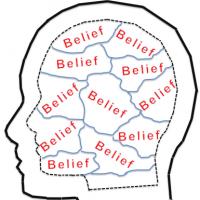What Do You Believe?

I meet many people who are convinced there is One Way to Do Agile. Oh, and it’s the way they are using the agile practices. In their opinion, everyone should do agile their way.
They believe that the kanban board is more valuable than a Scrum board—or the other way around. They believe that as long as the team estimates together, it doesn’t matter how big the stories are—or they believe that stories the team can finish in one day are the right size. They believe in their burnup charts—or they hate burnups and believe in their burndowns.
We have plenty of beliefs in the agile community.
They exist because we have different contexts for our agile approaches. We work in different domains, with different teams, solving different problems.
And we have confirmation bias. Confirmation bias reinforces our beliefs. It doesn’t matter if our beliefs are correct; we will search for and only see data that supports our beliefs.
Our confirmation bias prevents us from seeing other options, hearing possible arguments to change, and believing data to the contrary.
There are, however, ways to avoid confirmation bias:
- Decide that you will seek data to support an opposing opinion or belief. If I say to you, "Multitasking makes it impossible for you to estimate well," and you don't believe me, seek data that supports my opinion. If we plan to discuss this topic, it’s my job to provide you data that supports your opinion. If I can’t find you data, that is meta-data.
- Experiment inside your projects. If you always take the first solution, you might miss better possibilities. I have had success saying, “Let’s try this for an iteration or two, then reflect with data to see if this possibility helped or hurt. If this alternative doesn’t work, we can try others. We might even plan to try other alternatives to see which one works best for us.” Experiments will provide you data to reinforce or change your beliefs.
- Allow yourself to change your beliefs. The more we hold to our beliefs, the less likely we are to change anything.
When we talk about beliefs, we lead with our guts—our intuition. However, our intuition is not sufficient to help us grow and learn.
Beliefs are fine for religion. But for software teams? We deserve data-based approaches to determine what we need to do for the best outcomes for the people, the products, the customers, and the organization itself.
What do you believe? Can you make it about data and use evidence for your decisions?

